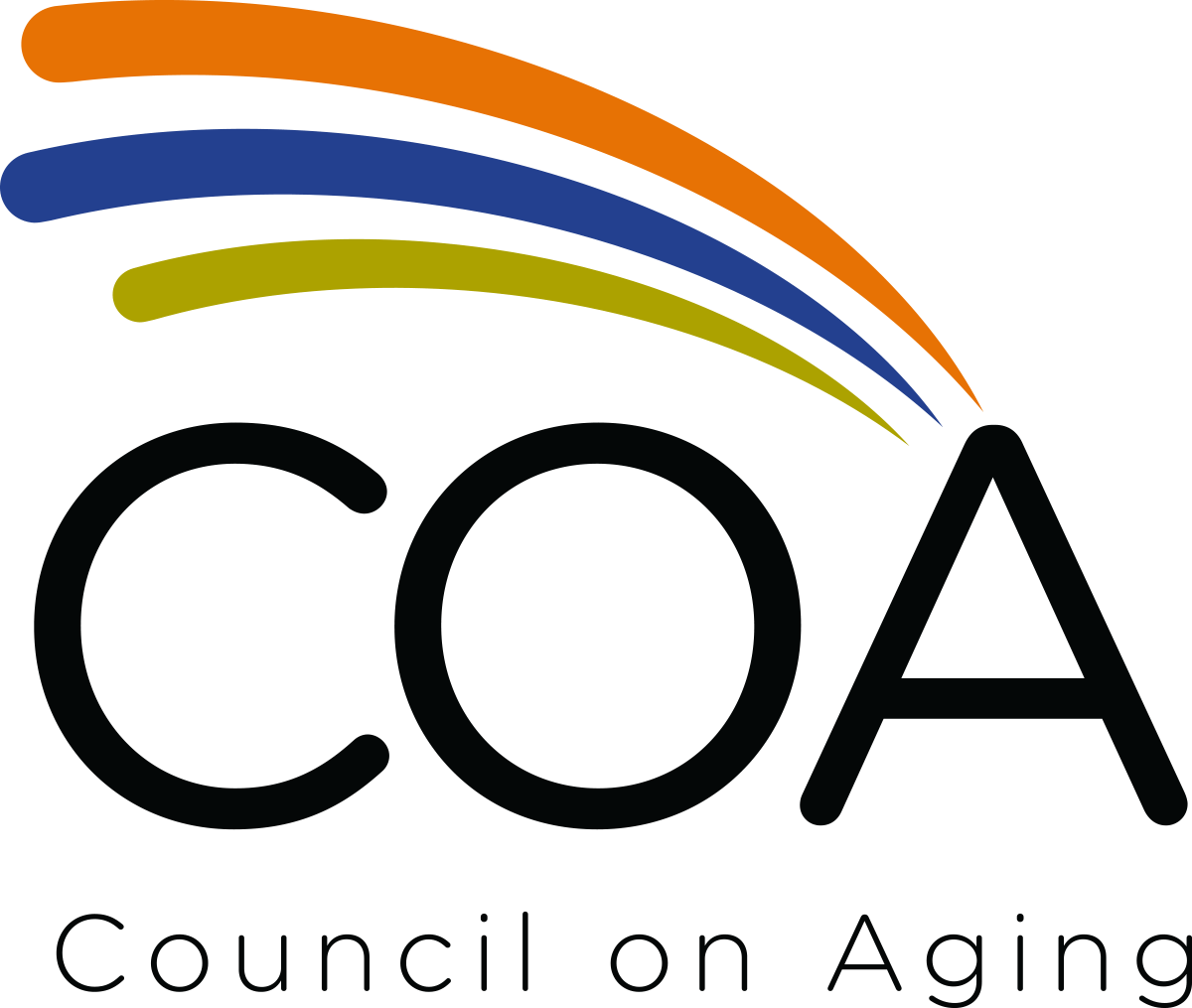Hamilton County Elderly Services Program 2021 Annual Report
Below are the full success and client stories from the Hamilton County Elderly Services Program (ESP) 2022 Annual Report. These stories illustrate the impact ESP has on older adults and caregivers in Hamilton County.
Click here to view the program’s 2022 annual report. To request a paper copy, email us.
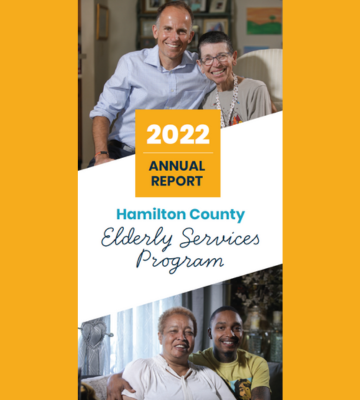
ESP helps veteran remain independent after a stroke

Duncan remembers the day well: January 14, 2011. He decided he could no longer ignore the strange sensations he had been having. His computer mouse felt like it weighed 10 pounds; a pen felt so floppy in his hand that he couldn’t write.
“I had tried to argue with myself,” he said. “’You’re alright. You’re fine.’ But I finally told the landlady that I thought I might be having a stroke. She called emergency and from then on, that was life-changing for me.”
At age 71, Duncan had indeed had a stroke. He was hospitalized and then in rehabilitation for three months. Returning home, he knew that without any family to help him, he would need support if he wanted to stay independent.
“That was a real education process for me,” he said. “Me and my pride decided it was time for me to admit that I needed this or that… It’s important to me – as it is for anyone – to be self-sufficient. I realize there are things I can do for myself. I don’t want to be a bother, so to speak, to someone else. “
Fortunately, it wasn’t long before Duncan learned about the Hamilton County Elderly Services Program (ESP). His services include home care assistance once a week (personal care, housekeeping and respite), an emergency response device and home-delivered meals. Recently, he received a lift chair. “I didn’t think I needed it,” he said, “but I use it all the time. The caseworkers are good at trouble shooting. They seek solutions and that’s terrific.”
Born in Beckley, West Virginia, Duncan, 81, grew up in coal mining country. In 1960, he enlisted in the U.S. Air Force, serving four years of active duty and four years in the reserves. After leaving military service, he became an FCC-licensed studio technician. He started out at a small radio station in Beckley and then moved to television stations. Later, he was a service technician for fax machines until it was clear there was little future in that work. He moved on to maintenance and janitorial services for Ohio Valley Wine and Beer Distributing and worked there until the time of his stroke.
Duncan lives quietly now, continues to go to therapy, and recently moved to a more accessible ground-floor apartment. He enjoys watching woodworking videos on YouTube and occasionally baking his favorite oatmeal cookies.
“I watch some of those exercise videos on YouTube,” he said. “But they always start out saying, ‘Get down on the floor.’ Well, that’s something you wouldn’t want to see – me looking for a way back up.”
Exercise is important though, so he has checked out an easy route from his new apartment where he can take his walker for a spin.
“The best thing about the program is when [my aide] comes in once a week to help with cleaning or to run an errand for me,” Duncan said. “It’s really helpful and encouraging. It’s that extra contact with the rest of the world. It’s something I look forward to.”
New financial management services provider makes it easier for ESP clients to hire their own caregiver
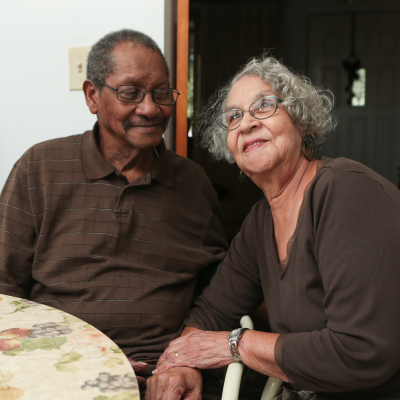
As ESP’s administrator, COA contracts with organizations to deliver services to clients. Contracts are awarded through a competitive bidding process via requests for proposals (RFPs). The goal of the RFP process is to identify and contract with service providers who can offer the highest quality services at the lowest possible cost in order to serve as many older adults as possible with the available tax dollars.
In September, COA issued an RFP for Financial Management Services (FMS) in the Elderly Services Program. The FMS provider supports ESP clients who utilize the program’s consumer-directed care option to recruit and hire their own aides. In this case the ESP client or designated family member is the “employer” and the aide they hire is their “employee.” The FMS provider, on the client’s behalf, manages all the financial and payroll related responsibilities in addition to criminal background checks that go along with being an “employer.”
COA received six proposals in response to the RFP. After all bids were scored, Palco, Inc. was selected as the new FMS provider. The new contract took effect in January 2022 and the process of transitioning current consumer-directed care clients is now underway.
“The new contract with Palco could not have come at a better time,” said Ken Wilson, COA’s vice president of program operations. “There is a severe shortage of home health aides which is impacting ESP’s ability to match clients with home health aides through traditional avenues such as home care agencies. The FMS provider is a key partner in helping us expand the consumer-directed care option of ESP, enabling older adults to work outside of those traditional sources to hire their own aides or caregivers.”
Wilson added that Palco has a history of working with older adults who use programs like ESP to hire their own aides. He said with the transition to Palco, clients who hire their own caregiver can expect a faster enrollment process with expert customer support. “Ultimately, this means we’ll be able to expand the consumer-directed care service to more older adults,” Wilson said.
Council on Aging helps older adults get COVID-19 vaccinations
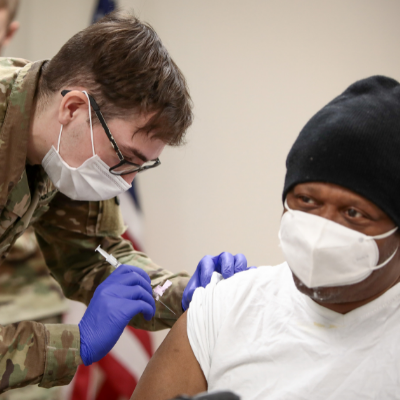
Since February 2021, Council on Aging (COA) has played a key role in helping more than 3,000 area older get vaccinated against COVID-19, while helping countless others connect to information about the available vaccines.
When Ohio rolled out its statewide COVID-19 vaccination plan in February 2021, older adults were among the first eligible groups to receive a vaccination. However, older adults had difficulty getting vaccinated for two primary reasons: 1) there was not enough vaccine to meet the demand; and 2) most vaccine registration systems required use of a computer or smart phone to make an appointment – a barrier for many older adults. There was also confusion about where older adults could go for assistance in navigating a fragmented vaccine system.
COA helped older adults overcome these barriers by:
- Helping older adults find vaccine providers in their community. COA staff monitored local vaccine availability and helped older adults schedule appointments or join applicable waiting lists.
- Providing no-cost, roundtrip transportation to vaccination appointments for eligible older adults.
- Assisting the Ohio National Guard with vaccination clinics at low-income senior apartment buildings in the region, including coordinating busing from nearby senior communities to maximize the number of people vaccinated at each clinic. Governor Mike DeWine and First Lady Fran DeWine attended one of these clinics and praised Area Agencies on Aging for their work in helping older adults through the pandemic.
“This is the first time COA has worked with the National Guard to vaccinate older adults in this way,” said Ken Wilson, COA’s vice president of program operations and a lead coordinator for the vaccination clinics. “There was a lot of coordination and planning that went into these clinics. It was great to see everyone working together with one goal in mind: protecting vulnerable older adults from COVID-19.”
Residents who came for vaccine appointments showed a range of emotions. Some were apprehensive about getting a new vaccine, but recognized it was their best option for getting their lives back to normal.
“I never get the flu shot,” a resident at an area senior apartment building reported, “but I thought this was important.”
In March 2021, COA began working with local health departments to vaccinate homebound older adults. For many older individuals, leaving their home to get vaccinated could result in serious physical hardship or present a danger to their health. As a result, COA advocated at the state and local level for a process to vaccinate homebound older adults.
| 2023 Update: Due to the end of the COVID-19 pandemic, COA’s Homebound Vacinnati Program is no longer available. Vaccines may be available at private doctor offices, pharmacies, workplaces, community health clinics, health departments or other community locations, such as schools and religious centers. If your primary healthcare provider does not stock all the vaccines recommended for you, ask for a referral. You may also find locations providing the flu and COVID-19 vaccines in your community at www.vaccines.gov. |
“We’d been helping older adults get vaccinated since Ohio’s vaccination plan went into effect,” said Ken Wilson, COA’s vice president of program operations. “From the beginning, we worked to find a way to vaccinate older adults who could not leave their homes. Because COA provides in-home care services to homebound older adults in southwestern Ohio, we were in a good position to identify who in the community needed this service.”
COA worked with local health departments to develop a plan to vaccinate homebound older adults. Using the Centers for Disease Control and Prevention’s (CDC) guidelines for vaccinating homebound individuals and a locally-developed screening tool, COA built a list of individuals who qualify for in-home vaccination in southwestern Ohio. The list included COA clients, as well as individuals from the community not enrolled in a COA program. In all, more than 900 Hamilton County older adults have been referred to local health departments for in-home vaccinations.
On a weekly basis, COA provided local health departments with a list of homebound individuals in their jurisdiction. Health departments then contacted these individuals to schedule their appointment. This work continues as older adults continue to get vaccinated against COVID-19.
“Some people think because they’re homebound, they’re not high-risk, but it’s actually quite the opposite,” Wilson said. “Most homebound individuals have two or more health conditions which put them at risk for severe complications, hospitalization or even death from COVID-19. And, these individuals have people who are coming and going from their home – caregivers, home health care and others – which can increase their risk of exposure.”
COA’s efforts to help older adults get vaccinated against COVID-19 continue. A major focus at the time of this writing is booster shots. Booster shots are important because the vaccine’s effectiveness at preventing serious illness lessens over time – especially in people age 65 and older.
Links to more reading:
- COA, National Guard partner on vaccination clinics in low income senior buildings
- COA helps older adults access COVID-19 vaccine
- Town Halls to prepare buildings for vaccination clinics
- Council on Aging helping to vaccinate homebound older adults
COA and home52 launch on-demand transportation system
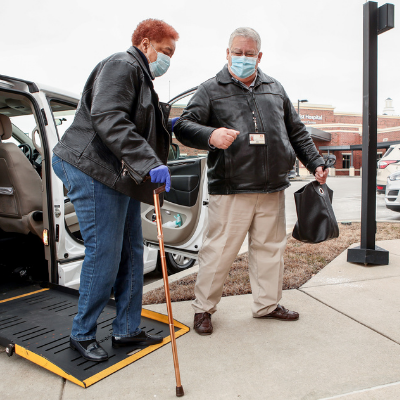
As the Area Agency on Aging for southwestern Ohio, including Hamilton County, Council on Aging (COA) has long sought a way to improve transportation services for older adults and people with disabilities in the region. Census data and research conducted by COA revealed a growing population of older and disabled adults in our region and a lack of confidence in the region’s transportation infrastructure to meet the growing need.
Health experts agree: Reliable transportation is one of the most important social determinants of health for older adults and people with disabilities. Transportation to medical appointments plays a significant role in improving health outcomes, lowering costs and increasing patient satisfaction. In addition, non-medical transportation for activities such as grocery shopping or accessing community resources can improve an individual’s ability to remain healthy, independent and engaged with their community.
Add to these needs the challenges of a decades old transportation system, and COA felt the time was right to rethink how we meet the transportation needs of this growing population.
In 2019, COA applied for and received a $470,000 grant from the Federal Transit Administration (FTA). The award was part of FTA’s Access and Mobility Partnership Grants which awarded approximately $9.6 million to 37 projects to support innovative transportation solutions to expand access to health care.
Through its subsidiary, home52, COA used this funding to develop a Transportation Coordination System, home52 Transportation, that provides centrally coordinated, on-demand non-emergency medical transportation service to older adults in COA’s service area.
home52 Transportation maximizes the efficiency of available vehicles across multiple service providers, while providing a higher level of support and customer satisfaction to older adults and people with disabilities in our community. Through a central coordination center, staff track rides, know when drivers are late, communicate with customers and contact medical providers to ensure customers will still be seen.
home52 Transportation launched in May 2021 as a pilot in the Hamilton County Elderly Services Program (ESP). Since that time, home52 Transportation has coordinated more than 17,000 one-way trips for 880 Hamilton County ESP and FastTrack Home clients.
The service was also instrumental in helping older adults across COA’s service area get to their COVID-19 vaccination appointments. In 2021, home52 Transportation assisted 712 individuals (not enrolled in COA programs) with transportation to vaccination appointments.
Additionally, home52 Transportation received $55,000 from the City of Cincinnati Human Services Fund to coordinate free non-emergency medical transportation for low-income older adults. home52 is partnering with low-income senior housing units in the City of Cincinnati to coordinate transportation for residents who have barriers to appropriate transportation to meet their medical needs.
Service receives positive feedback from riders and service providers
Since launch, home52 Transportation has received feedback from stakeholders, including providers and riders, and has sought opportunities to improve service delivery.
Through feedback from approximately 600 customer surveys, riders have expressed appreciation for a centralized call center, the opportunity to provide regular feedback about the service they receive, and quick responses with addressing concerns.
- 86 percent of surveyed riders rated the overall quality of home52 Transportation’s coordination service as above average or excellent.
- 99 percent of surveyed riders said the transportation coordination center staff were kind and courteous.
- 96 percent believe home52 Transportation helps improve their health and 58 percent indicated without this service they would have gone to Urgent Care, the Emergency Room or called 9-1-1 for medical treatment.
“The staff from home52 Transportation called to double check the date, time and location for my scheduled rides. This was reassuring, and I appreciated the call,” said Rebecca, a Hamilton County FastTrack Home client. “My two scheduled rides…were very smooth. I received notifications about the arrival of my rides coming and going. This was my first time using the service and it was wonderful.”
When Dolores’ doctor was running two hours behind the day of her appointment, the Hamilton County ESP clent was concerned about missing her ride home. But she was reassured by home52 Transportation staff that a ride would be ready when her appointment was over. As promised, Dolores had transportation after the appointment and she reported the driver was pleasant and kind. “I’m very thankful for the service. With no family and my friends are all gone, there is no one to help with doctor appointments. Everyone was very courteous.”
Aretha Furr, of A-List Transportation and Cleaning, shared her perspective on joining the home52 Transportation network. “Bryan and Marsha are very helpful with any questions I have about the system and are willing to walk me through step by step to answer all my concerns. The mission of home52 Transportation correlates with my business and I’m happy to be part of the program.”
Caregiver Support Program now offers overnight respite
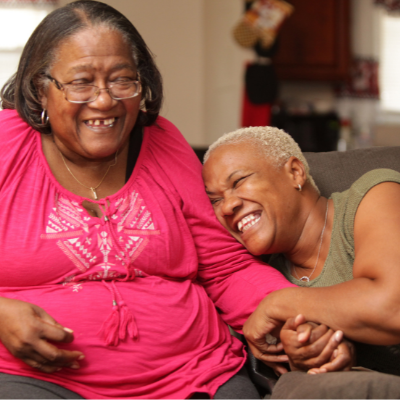
Council on Aging’s Caregiver Support Program offers one-on-one support, advice and resources to family and other informal caregivers to help them manage their caregiving responsibilities. And now, the program is also able to offer overnight respite care so caregivers can take a much-needed break.
If appropriate, this service will provide up to seven days (overnight) of care in an area care facility. All of the care recipient’s needs will be met while at the care facility. Caregivers are then free to use this time for respite – rest, catch up on housework or paperwork, visit out-of-town friends/family, take a vacation, etc.
Since overnight respite care was first offered in July, the service has supported five family caregivers in Hamilton County by providing 47 days of overnight respite
“Caregivers give so much of themselves and often neglect their own needs when caring for a loved-one,” said Anna Goubeaux, RN, COA’s caregiver support nurse. “Caregiver burnout is one of the top reasons older adults and people with disabilities end up in nursing homes. Supporting caregivers and giving them much-needed time off benefits everyone.”
COA’s Caregiver Support Program is available at no cost to caregivers or care recipients aged 60 and older. The caregiver must live in Butler, Clermont, Clinton, Hamilton or Warren counties. There is no age requirement for family caregivers who provide care for individuals with Alzheimer’s disease or related disorders with neurological and organic brain dysfunction.
The overnight respite care is available to eligible caregivers of individuals who have a cognitive impairment (Alzheimer’s disease or dementia, for example).
Learn more about Caregiver Support.
Program recognized for diverting older adults from hospitals and nursing homes during the pandemic

Council on Aging (COA) received a 2021 Inspire Healthcare award from The Health Collaborative for Discharge to Home, a program developed by COA during the pandemic to provide a safe, supportive path home for older adults being discharged from area hospitals and nursing facilities, while also freeing up valuable healthcare resources.
Inspire Healthcare is the region’s premier healthcare awards event, recognizing regional heroes who are pioneering efforts in improving health and healthcare. COA was a finalist in the program’s Gen-H category, which recognizes compelling programs, policies, system-level or environmental change strategies that improve community health.
“At the start of the pandemic, older adults were getting sick and dying from COVID-19 at much higher rates than the rest of the population,” said Ken Wilson, COA’s vice president of program operations. “Discharge to Home achieved two key goals for our region: it diverted older adults away from COVID hot spots such as nursing homes and rehab facilities, and it helped preserve valuable and limited healthcare resources during peak periods of the pandemic.”
Leveraging an existing transitional care program, FastTrack Home, COA quickly developed and implemented Discharge to Home to provide a centralized process for older adults who were going home from hospitals and nursing facilities but needed supportive services for a safe and effective recovery – regardless of their COVID status.
During the first year of the pandemic, Ohioans aged 60 and older accounted for 65 percent of all COVID-19 related hospitalizations in the state (and 93 percent of deaths). At times, nursing facilities had some of the highest infection and death rates in Ohio. Hospitals wanted to avoid sending patients to nursing homes for recovery, while nursing facilities were looking for safe ways to discharge patients who had completed recovery or therapy and were ready to go home.
Through Discharge to Home, hospital and nursing facility staff could quickly and safely discharge patients home with supportive services. Referrals could be made to COA staff seven days a week via phone, fax, email, or by working directly with COA staff assigned to specific hospitals. COA staff met with patients and families to assess care needs and ensure services were in place when the patient arrived home. Typical services included home-delivered meals, transportation, personal care and housekeeping support.
Discharge to Home included safety measures to protect both care providers and care recipients from the spread of COVID-19. COA adapted service delivery models to protect service providers (home health aides, meal drivers, transportation providers, and emergency response system installers) who were providing services to patients recovering at home with or from COVID-19. These measures also provided protections for patients who had not previously had or been exposed to the virus.
From April 2020 through December 2021, more than 4,600 area older adults have been discharged from area hospitals and nursing facilities using this coordinated process, including more than 3,700 Hamilton County residents. And, according to state public health data, less than 10 percent of COVID-19 related deaths in long-term care facilities occurred in facilities located in COA’s service area.
About Discharge to Home and FastTrack Home
COA leveraged its award-winning FastTrack Home program to quickly implement Discharge to Home. FastTrack Home focuses on helping older adults complete smooth transitions from one care setting to another – primarily from hospitals or nursing homes, to a patient’s home. FastTrack Home puts temporary in-home care services in place before an older adult goes home from the hospital. While other COA programs require an in-home assessment and focus on meeting long-term needs, FastTrack Home assessments are completed at the hospital bedside and are designed to meet short-term, acute needs. This distinction is key because older adults have an increased risk of illness and injury in the 30 days following discharge from a care facility. With a speedy assessment and enrollment process, FastTrack Home services can be in place when the patient is discharged home.
During the pandemic, more than 40 percent of Discharge to Home patients were routed through COA’s FastTrack Home program, available in Hamilton, Clinton and Warren counties. In counties where FastTrack Home was not available, Discharge to Home patients were connected to supportive services through other COA programs.
Comfort Meal program grows, wins awards during year two of pandemic
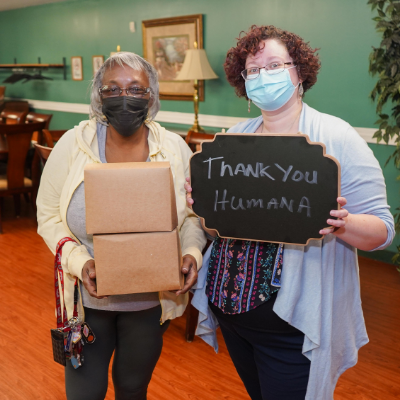
Council on Aging’s Comfort Meal Program, which began in April 2020 at the start of the pandemic, continues to have an impact on area older adults. Since its start, the program has provided nearly 135,000 meals through up to 10 restaurant partners, including more than 111,000 meals in Hamilton County alone.
When the COVID-19 pandemic began, COA heard from older adults who were afraid to go out for groceries and other necessities. They felt isolated, alone and forgotten. Others found themselves without their regular support network. Many who contacted COA had never before needed help.
Food security immediately became a focus for COA, with social isolation following close behind. Council on Aging began searching for ways to bring comfort to older adults – particularly low-income older adults – who were stuck in the monotony created by the pandemic.
“We’ve learned from past emergency situations that food quickly becomes an urgent need for older adults,” said Council on Aging CEO, Suzanne Burke. “We partnered with area restaurants to not only help meet the nutritional needs of older adults during the pandemic, but to also help them feel connected to the outside world. Things may be returning to normal, but many older adults are still weary of being in crowds, and sadly, some have fallen out of touch with their social and support networks. We plan to continue this program for the foreseeable future, so older adults have time to adjust to life changes caused by the pandemic.”
At its peak, COA’s comfort meal program included 10 area restaurants, including Neal’s Famous BBQ in Hamilton. Restaurants and meal providers currently involved in the program include LaRosa’s, Taste of Belgium, Frisch’s and Hamilton County-based Chef Anthony Jordan.
While the program’s primary focus is feeding and bringing comfort to low-income older adults, the program also provided a boost to COA’s local economy at a critical time.
“This is an opportunity for us to bring some people back to work and to keep the lights on at our commissary,” said Jean-François Flechet, owner of Taste of Belgium, at the start of the program in April 2020. “But more importantly, it’s an opportunity to give back and to be a part of something good that’s happening in our community.”

Hamilton County’s Chef Anthony Jordan joined the program in July 2020 and continues to prepare homemade comfort meals for older adults in COA’s service area.
A Certified Personal Chef, Jordan has led cooking classes for older adults and children through the Cincinnati Recreation Commission, Center for Closing the Health Gap and Cincinnati State University.
With a focus on health conscious and diet-specific meal planning, Chef Jordan provides fresh, healthy alternatives to traditional comfort food – macaroni and cheese made with whole wheat noodles and homemade cheese sauce; meatloaf prepared with lean ground turkey; and burrito bowls packed with power greens, grilled chicken and roasted vegetables.
“For me personally, this connection and collaboration with COA is huge,” Jordan said. “These are our people, our elders. COA stands in the gap [to help older adults] and I want to emulate that.”

COA’s comfort meal program is a community partnership. The meals are paid for by COA – via grants, donations and federal funds designated to expand meal service to older adults during the pandemic. COA service providers, including Meals on Wheels of Southwestern Ohio & Northern Kentucky (MOW), collect the meals from participating restaurants and deliver them to low-income senior apartment buildings across COA’s service area.
“The restaurants and providers have become quite a team,” said Burke. “The restaurants are a significant part of COA, and we are a significant part of their business. We’re all in it because we care.”
In 2020 and 2021, the comfort meal program received several local, state and national awards, including:
- Ohio Association of Area Agencies on Aging: Outstanding AAA Partnership of the Year (October 2020)
- Clinton County Community Champions Award: Non-Profit Category Winner for Comfort Meal Program (November 2020)
- Alliance of Information and Referral Systems (AIRS): Innovation Award, Disaster Preparedness Category, Comfort Meal Program (May 2021)
COA also received a $25,000 Bold Goal grant from Humana to help fund the comfort meal program in Hamilton and Butler counties. Bold Goal is a population health initiative focused on improving the health of the communities served by Humana. The grant funded monthly comfort meal deliveries at three low-income senior apartment buildings in COA’s service area for one year. Humana has renewed its Bold Goal grant with COA for 2022.
COA and the program’s restaurant partners have received countless phone calls, letters and cards from comfort meal recipients, all with a similar theme: Thank you for remembering us.
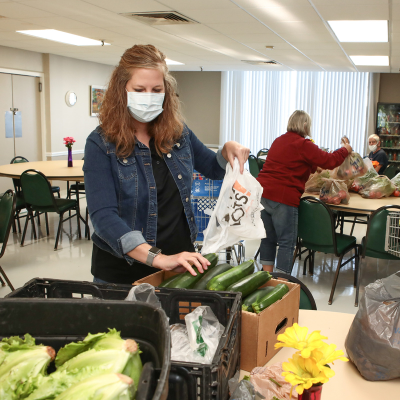
Senior farmers’ market program nearly doubles participants in 2021
In its second year operating in southwestern Ohio, the United States Department of Agriculture Senior Farmers’ Market Nutrition Program nearly doubled in size, providing 2,213 low-income area older adults with fresh, local produce for no out-of-pocket cost. Nearly 1,200 Hamilton County older adults participated in the 2021 growing season, a more than 50 percent increase over the program’s first year.
Working with community members and the Ohio Department of Aging, Council on Aging brought the program to its service area for the first time in 2020. Despite the challenges and uncertainty posed by the early months of the COVID pandemic, more than 1,100 people participated in the program in its first year.
COA honors area home health aides as 2021 heroes
Home health aides provide critical and often life-saving care for older adults who want to remain in their homes as they age. In addition to providing personal care and assistance with everyday tasks, home health aides get to know their care recipients intimately and can be the first to notice critical changes in physical and behavioral health. In 2021, COA was pleased to recognize three local individuals as 2021 Home Health Aide Heroes. Read more…
